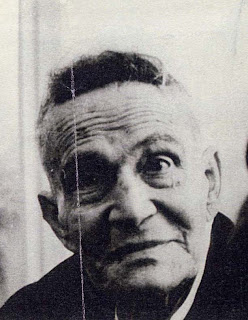 William Caraher has been researching the relationship between dreams and archaeology, specifically how visions have assisted the discovery of new sites. This is an ancient trope that Caraher has been tracing through Late Antiquity, Byzantium and Greek folklore. His research has taken a turn towards psychoanalysis and the figure of Angelos Tanagras, the Greek pioneer in psycho-physical studies. Tanagras happens to be my great uncle, the brother of Katerina Bravos, my maternal grandmother. My mother and aunts were extremely close to Tanagras, he was their closest thing to a father figure. He died when I was only five years old so I do not remember him well, but my mother and aunts always talked to me about him with curiosity and admiration. For today's posting, I will give a general overview of Tanagras' career to the degree that I have been able to reconstruct it. This might be helpful, since so little is available in English. In future postings, I want to make some speculative connections between Tanagras and archaeology, directly responding to Caraher's research.
William Caraher has been researching the relationship between dreams and archaeology, specifically how visions have assisted the discovery of new sites. This is an ancient trope that Caraher has been tracing through Late Antiquity, Byzantium and Greek folklore. His research has taken a turn towards psychoanalysis and the figure of Angelos Tanagras, the Greek pioneer in psycho-physical studies. Tanagras happens to be my great uncle, the brother of Katerina Bravos, my maternal grandmother. My mother and aunts were extremely close to Tanagras, he was their closest thing to a father figure. He died when I was only five years old so I do not remember him well, but my mother and aunts always talked to me about him with curiosity and admiration. For today's posting, I will give a general overview of Tanagras' career to the degree that I have been able to reconstruct it. This might be helpful, since so little is available in English. In future postings, I want to make some speculative connections between Tanagras and archaeology, directly responding to Caraher's research.Angelos Euangelidou was born in Athens in 1877. The name Tanagras is a literary pseudonym that he created for himself, surely based on the romantic associations of the Tanagra figurines (19th-c. archaeological discovery in Boeotia). Tanagras studied medicine at the University of Athens and pursued graduate studies in Berlin. He joined the Greek Navy in 1897, and fought in the Greek-Turkish war. He organized the health standard of Piraeus' port and an infectious disease center on the island of Salamina. He fought in the First Balkan War (1912-13) and World War I. During the 1922 destruction of Smyrna, he became public health supervisor of the International Committee of Asia Minor, organizing the city's health standards. He retired from the navy as Admiral and as Chief Health Commissioner.
His research and consequent claim to fame, however, was not directed on the physical body but on the psyche. Starting with his psychoanalytical research in Germany, he became a leading authority in the causality between psychic and physical phenomena. In 1923, he founded the first Greek psychological society, the Society of Psychic Research, that pioneered the study of paranormal phenomena. He published the journal Psychic Research. In 1930, he organized a very important meeting in Athens, the 4th International Congress of Psychic Research. His theories of "psycho-projection" were first published in Berlin (Zeitschrift für
No comments:
Post a Comment